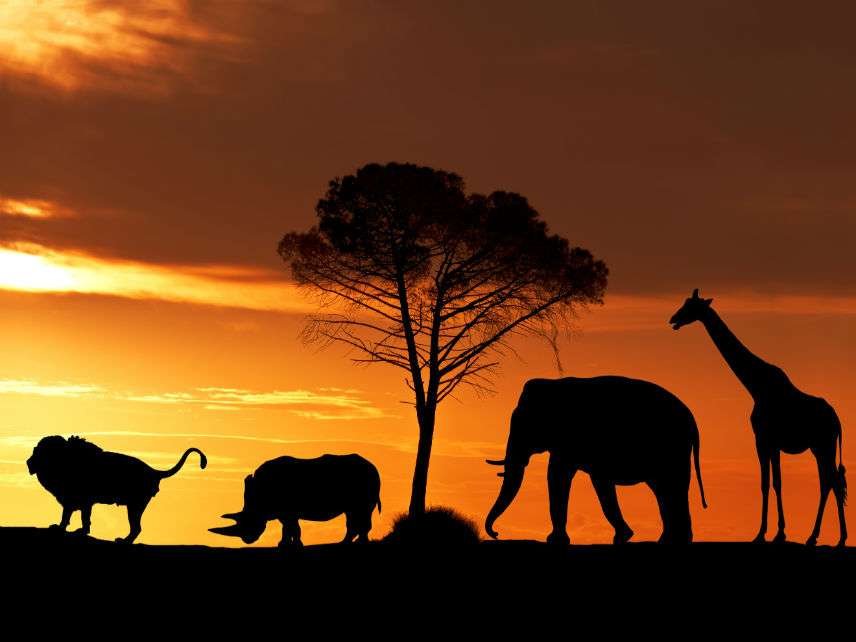How Concerned Should You Be About Species Extinction?
Not very, says biologist R. Alexander Pyron

A group of more than 15,000 scientists published "World Scientists' Warning to Humanity: A Second Notice," in the journal Bioscience earlier this month. The new warning was published 25 years after a first warning was issued by the Union of Concerned Scientists back in 1992. The alarmed scientists are worried about the deleterious effects of man-made global warming and human population growth, but also urgently warned that humanity has "unleashed a mass extinction event, the sixth in roughly 540 million years, wherein many current life forms could be annihilated or at least committed to extinction by the end of this century."
To prevent the coming mass extinction, the researchers urge that humanity take steps "(a) prioritizing the enactment of connected well-funded and well-managed reserves for a significant proportion of the world's terrestrial, marine, freshwater, and aerial habitats; (b) maintaining nature's ecosystem services by halting the conversion of forests, grasslands, and other native habitats; (c) restoring native plant communities at large scales, particularly forest landscapes; (d) rewilding regions with native species, especially apex predators, to restore ecological processes and dynamics; (e) developing and adopting adequate policy instruments to remedy defaunation, the poaching crisis, and the exploitation and trade of threatened species…."
In a fascinating op-ed, "We don't need to save endangered species. Extinction is part of evolution," over at the Washington Post, George Washington University biologist R. Alexander Pyron calls out "extinction fearmongers" and argues that "conserving biodiversity should not be an end in itself" and that "humans should feel less shame about molding their environment to suit their survival needs." As Pyron further points out:
There is no return to a pre-human Eden; the goals of species conservation have to be aligned with the acceptance that large numbers of animals will go extinct. Thirty to 40 percent of species may be threatened with extinction in the near future, and their loss may be inevitable. But both the planet and humanity can probably survive or even thrive in a world with fewer species. We don't depend on polar bears for our survival, and even if their eradication has a domino effect that eventually affects us, we will find a way to adapt. The species that we rely on for food and shelter are a tiny proportion of total biodiversity, and most humans live in — and rely on — areas of only moderate biodiversity, not the Amazon or the Congo Basin.
Developed human societies can exist and function in harmony with diverse natural communities, even if those communities are less diverse than they were before humanity. For instance, there is almost no original forest in the eastern United States. Nearly every square inch was clear-cut for timber by the turn of the 20th century. The verdant wilderness we see now in the Catskills, Shenandoah and the Great Smoky Mountains has all grown back in the past 100 years or so, with very few extinctions or permanent losses of biodiversity (14 total east of the Mississippi River, counting species recorded in history that are now apparently extinct), even as the population of our country has quadrupled. Japan is one of the most densely populated and densely forested nations in the world. A model like that can serve a large portion of the planet, while letting humanity grow and shape its own future.
Pyron's arguments mirror those made by United Nations Environment Programme researcher Martin Jenkins in his 2003 Science article, "Prospects for Biodiversity." In that article Jenkins noted, "In truth, ecologists and conservationists have struggled to demonstrate the increased material benefits to humans of 'intact' wild systems over largely anthro- pogenic ones [like farms]. . . . Where increased benefits of natural systems have been shown, they are usually marginal and local." Jenkins added that even if the dire projections of global extinction rates being made by conservation advocates are correct, they "will not, in themselves, threaten the survival of humans as a species."
I mourn the loss of species. Each species embodies complex genetic libraries, behavioral repertoires, and evolutionary histories that are both scientifically fascinating and aesthetically fulfilling. As a relatively well-off First Worlder, I have had the intense pleasure of walking in the wild within 40 feet of grazing rhinos and of swimming with Galápagos penguins. It would be a shame if future generations do not have an opportunity to enjoy such experiences.
In any case, with rising wealth, urbanization, and the approach of peak farmland, the dire predictions of mass extinction are most likely exaggerated.
Next week, I will finally get around to reviewing University of York conservation biologist Chris D. Thomas' superb new book, Inheritors of the Earth: How Nature Is Thriving in an Age of Extinction.


Show Comments (59)